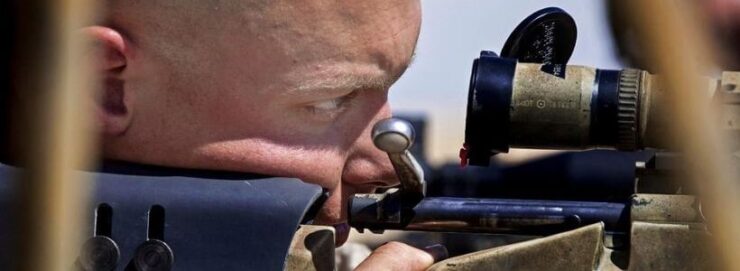Do you have a scope but have no idea what are all the functions that are on it? Do not worry, my friend, because this is your guide to one of the most essential features ” 2 MOA” that a scope contains.
The term MOA abbreviates to Minutes of Angle, and this is one of the features of the scope that make it a must when it comes to practice shooting on hunting. So let us dive into the article and find out what does 2 MOAs mean on a scope?
What Is MOA?
As you already know, MOA is the acronym for Minutes of Angle, where one minute is roughly equivalent to 1/60th degree in an angle. Now you might be wondering why minute because people usually associate minute with time.
But in this case, it refers to the small degrees of angles that shooters used. In a similar fashion, a shooter can use seconds instead of minutes, which indicates smaller angles than minutes.
It is a mathematical fact that a circle has 360 degrees. Likewise, a half-circle has 180 degrees, a quarter circle has 90 degrees, and it goes on like that. You can imagine how small a 1/60th degree is. No matter how small it may seem, this 1/60th degree can make a huge difference when it comes to shooting.
Why Shoot in Minutes and Angles?

When you shoot a bullet, it travels in a projectile motion because of the effect of gravity on the bullet. Here, the laws of physics come to play. As the mass of the bullet is so small, it can be shot out at a tremendous speed.
Because if it travels faster, the effect of gravity will be lesser, so the bullet will be able to travel at a longer distance with a wider arc. But no matter how fast the bullet is shot, it will lose its velocity and drop down to the ground eventually.
This understanding is important because you have to keep in mind the bullet’s trajectory when you are shooting. If you shoot straight ahead, then the bullet will just drop dead on the ground; it will not reach the target. The dimension, in inches, of where you aim at the target and where the bullet actually hits is called bullet drop.
Hence this entire mechanism is used. The arc is measured in degrees and angles, which the minute and the second calculations, so that we have a better assumption of where the bullet will drop.
What Is the Relation between MOA and Distance?
So we come to the main question: how long is a minute to be exact? So let me clear the confusion first. MOA is not the measure of the horizontal distance that a bullet covers. It is an angular measure of the bullet’s arc in the projectile motion. And it is used on scopes to make those angular measurements.
There are turrets on the scope to make such adjustments every time you make a shot. But the general rule is 1 MOA is equal to 1.047 inches at 100 yards. What it means is that if you make an adjustment of 1 minute, then you have controlled the trajectory of the bullet to 1 inch of change at 100 yards.
If the distance is longer or shorter than 100 yards, naturally, the measurement of 1 MOA will vary. The 1 MOA size chart is correspondent to the distance it is available online, so it will be helpful if you remember it by heart.
How Is MOA Used?
To fully understand the importance of MOA first, you need to take a couple of shots and figure how where you are going wrong. For example, imagine yourself at a shooting range. Without understanding or adjusting MOA, you take some shots by aiming at the bull’s eyes and hitting the mark 2 on the target.
That means you have to use your elevation turret on the top of the scope to fix the arc angle. To do this, you need to know at what distance you are shooting so that you can use your 1 MOA size chart and do the calculations.
If you are shooting at 200 yards, then 1 MOA is roughly equivalent to 2 inches. So you need to come up with 1 MOA to shorten your bullet drop.
You can learn by this trial and error method, which will develop your instincts. However, if you wish to be precise, there is a list of mathematical formulas you can use to make sure you hit the bull’s eye every time.
• (Distance to target in yards) / (100) = inches per MOA at that distance
• (The number of inches of adjustment needed) / (inches per MOA at that distance) = MOA adjustment
• (Number of clicks per 1 MOA on scope) x (MOA adjustment) = adjustment in clicks on the scope
What Does 2 MOA Mean on a Scope?
If you understood the rather scientific explanation of how MOA works, then I guess you can make an assumption of the answer to this question. In simple words, 2 MOA means that you take 2 minutes of adjustment on your scope.
So if we continue the example that you are shooting at a range of 200 yards and we know from the size chart that 1 MOA in 200 yards is roughly 2 inches, then by turning up the MOA by 2, you elevated your bullet trajectory by 4 inches approximately.
How Do You Make the Adjustments?
Now, this depends on the type of scope you own as they are 4 different types of scopes that make adjustments in 1, 1/2, 1/4, and 1/8 minute clicks. So if you own a scope that makes 1-minute clicks, then you only need to make the elevation turret click 2 times.
If you own a scope that makes 1/8 clicks per adjustment, then you need to make it click 16 times. The math here is fairly simple to understand.
Conclusion
Here you go, buddies, the full guide to how to interpret and use MOA on your scope. I hope this article address any confusion you had.
Hunters or professional shooters usually have this natural instinct to use MOA on a hunch, and they don’t bother with calculations, but that is because they’ve had a lot of practice beforehand.
Don’t fuss if you do not get it right for the first couple of times. We promise you will get there, you just need some practice and some patience.

